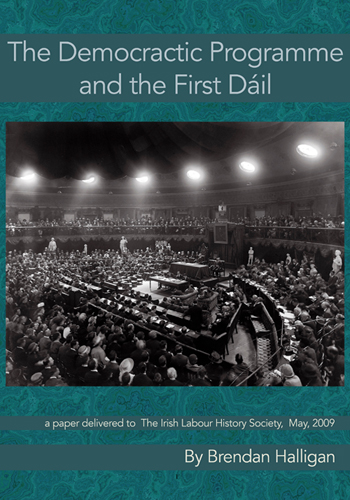WordPress database error: [You have an error in your SQL syntax; check the manual that corresponds to your MySQL server version for the right syntax to use near 'FROM wp_posts
WHERE 1=1 AND ((wp_posts.post_type = 'post' AND (wp_posts.' at line 2]SELECT SQL_CALC_FOUND_ROWS all
FROM wp_posts
WHERE 1=1 AND ((wp_posts.post_type = 'post' AND (wp_posts.post_status = 'publish')))
ORDER BY wp_posts.post_date DESC
LIMIT 0, 10

 The Democratic Programme and the First Dáil
The Democratic Programme and the First Dáil
By Brendan Halligan
This broad-reaching study entitled “The Democratic Programme and the First Dáil”, covers one of most fascinating developments in the early history of the Irish nation: the build up to the first Dáil’s drafting and adopting of their crucial “Democratic Programme” on 21 January 1919:
“The First Dáil, convened on 21 January 1919, is the subject of three myths, which have become received wisdom:
That the Labour Party, in an act of political cowardice, withdrew from the 1918 General Election as a result of pressure from Sinn Féin;
That by way of a sop to Labour, the Dáil adopted a democratic programme which weakly reflected the principles and philosophy of the party, and
That as a direct consequence of its refusal to contest the 1918 general election, the Labour Party suffered permanent electoral damage and condemned itself to being a minor political player.
Yet, simultaneously, the First Dáil is now mainly remembered for the “Democratic Programme” which was drafted by the Labour Party and quickly attained iconic status that has grown stronger over time. There is an obvious paradox here, which needs to be resolved. There are three points to make in setting the record straight.
First of all, the history of the period has been written by historians with little or no understanding of the Labour movement and, even less sympathy for its policies and leading personalities. Secondly, much of that history is pure propaganda. Thirdly, little of it indicates any understanding of political processes then in play, especially the interaction of the leading personalities in the independence movement.
Suffice it to say that each of the three propositions are false and in no way supported by the facts when examined in the light of contemporary records.
That said, the key to understanding the Democratic Programme lies in the period between the Rising and the General Election in December 1918. More importantly, it lies in understanding the role of three individuals occupying central positions in the Labour Party, namely, William O’Brien, Thomas Johnson and Cathal O’Shannon.
As for the period itself, it was one of the most tumultuous in history – in which events moved at astonishing speed. The dominant reality throughout those two years was the First World War, in particular the mass slaughter on the Western Front which was draining each belligerent of its man power.” …
The document is a paper originally delivered The Irish Labour History Society in May, 2009.
For a downloadable PDF, click here